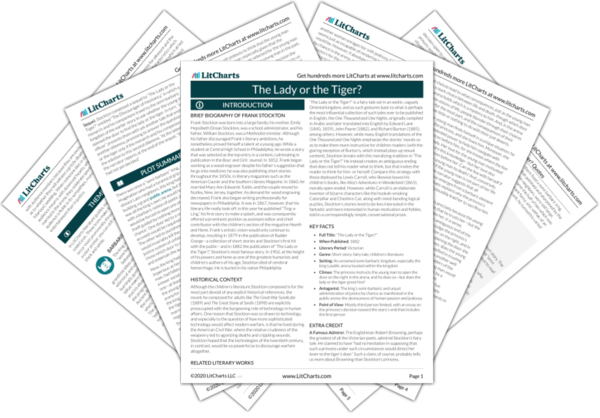By the end of the story, the narrator leaves open the question as to whether the princess directs the young man to the lady or the tiger, thereby putting us in a position of judgment: “Did the tiger come out of that door, or the lady?” Many readers take this as an invitation for us to decide whether the young man is greeted by the lady or the tiger, but doing so would be just as whimsical and imaginatively tyrannical of us as the king’s actions are.
Besides the narrator makes it explicit that this is not the decision open to us at all: rather, we are to interpret what the princess would do, based on our knowledge of her nature and situation. But do we know enough even to consider giving a definitive interpretation as to what the princess would do, and, in the second place, are we impartial enough to judge her fairly? The story seems skeptical on both counts. We presumably do not share the young man’s love for the princess, and hence don’t trust her absolutely, but we nonetheless bring our own personal experience and attitudes to bear on the princess’s decision, even if only subconsciously. Just as the story suggests that people can’t know one another with certainty, as is the case with the young man and the princess, so too does it suggest that interpreters can’t ever make any interpretive claims with certainty, but are always in a sense interpreting their own wishes, anxieties, and biases instead.
It is perhaps best to follow in the narrator’s footsteps at the end of the story and to concede that interpretive claims are presumptuous and that interpretation is best suspended when confronted with unanswerable ambiguities.
Interpretation and the Interpreter ThemeTracker

Interpretation and the Interpreter Quotes in The Lady or the Tiger?
Now, the point of the story is this: Did the tiger come out of that door, or did the lady?
The more we reflect upon this question, the harder it is to answer. It involves a study of the human heart which leads us through devious mazes of passion, out of which it is difficult to find our way.









